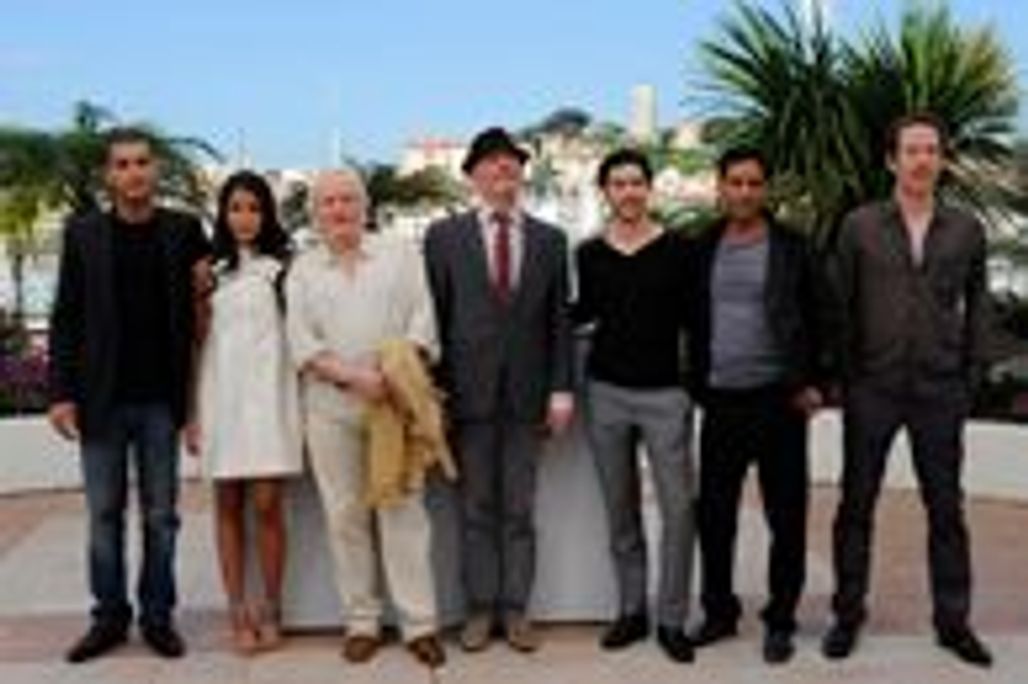
“A Prophet” speaks to the press

For the presentation in Competition of A Prophet, director Jacques Audiard, the actors Tahar Rahim and Niels Arestrup, writers Thomas Bidegain, Nicolas Peufaillit, and Abdel Raouf Dafri, and producers Pascal Caucheteux and Marco Cherqui answered questions from journalists. Highlights follow:
Jacques Audiard on his interest in the Corsican mafia, and on the title of the film:
"What I was interested in, in the Corsicans – I didn’t want to undertake a kind of cultural or sociological analysis – was the way the kind of mafia environment forms. When they are in the prison, they move around in groups. It could have been Serbs or Basques, or some other cultural group. That’s what I was interested in. I wanted an entity, a closed entity which was difficult to penetrate. The fact that they’re Corsicans is not really the point… There was also this idea, of having an aging mob, with the structures which were rather worn down and rotten. And then the new guys arriving, with another culture, with another language, with another way of doing things. The title, A Prophet, connotes a kind of religious injunction, so there is also a kind of irony. This prophet is announcing a new criminal prototype. Tahar plays a criminal who is not necessarily a psychopath. He’s an intelligent, almost angelical creature, and the title also announces that."
Tahar Rahim on his approach to the character:
"I studied documentaries and various films concerning the prisons, the prison environment, and homeless people, but I soon understood I couldn’t take that path entirely. We had to build up everything, starting with nothing, as it were. I had to create somebody different, totally different, and that was the difficulty… It was a composition. I had to make up the role."
Jacques Audiard on the realism of his film:
"In France today, if you try to make a film about prison, you have two obstacles. At least we did, in our work. The first is the documentary. I didn’t want to make a film that tended to be social criticism: that angle didn’t interest us. And the other obstacle was the influence of the image of prison, created by American TV series. Those archetypes and stereotypes are not specific to France… We visited lots of prisons… and the model corresponded to the late 19th-century prisons described by José Giovanni. But this wasn’t contemporary enough for us. Since we couldn’t shoot in large prisons which are actually functioning today, we had to build a set. This was a very important step for us, because in retrospect, we can see that the film began emerging out of Michel Barthélémy’s set. We saw the prison emerging, as it were, in an industrial zone in Gennevilliers. It wasn’t a studio where we could move things around. We actually built a prison for ourselves. And when you go to prison every morning, the realism is a reality."
Niels Arestrup on learning Corsican dialect, and his character:
"Corsican is really foreign to my experience. When I met with Jacques, I asked him if he was really sure I was right for the part, given all the physical and cultural differences. I worked with a coach for several months. I had to learn to feel the music of the words, not merely say them. To feel a little bit freer with the language. I allowed myself to be directed, accompanied, and led by Jacques Audiard. It wasn’t the first time we’d worked together. This was a fortunate, difficult, tough experience, a very complex experience, too… With hesitations, at times, but an extraordinary experience as an actor. He’s an amazing director."


